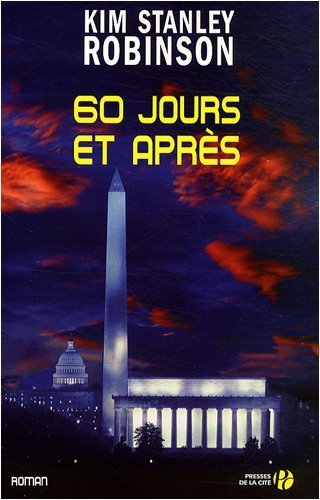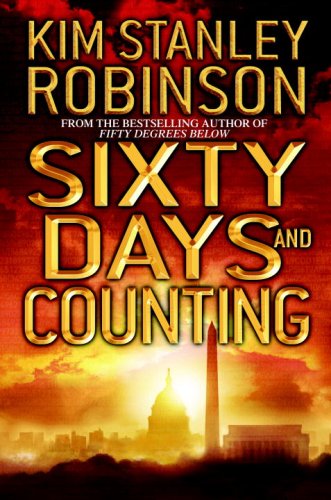Hard SF discussion
Sixty Days & Counting (Dec 2010)
>
BotM: “Sixty Days and Counting” by Kim Stanley Robinson
date newest »
newest »
 newest »
newest »
message 1:
by
Richard
(last edited Dec 01, 2010 11:21AM)
(new)
Dec 01, 2010 11:21AM
 October’s brought us Robinson’s
Forty Signs of Rain
, and we followed up with
Fifty Degrees Below
in November. Well, consistency can be a good thing, and apparently Robinson’s series is good enough folks have consistently voted for it, so in December we’re finishing off the series with
Sixty Days and Counting
.
October’s brought us Robinson’s
Forty Signs of Rain
, and we followed up with
Fifty Degrees Below
in November. Well, consistency can be a good thing, and apparently Robinson’s series is good enough folks have consistently voted for it, so in December we’re finishing off the series with
Sixty Days and Counting
.

reply
|
flag
 I should probably admit that I actually read this back in November, since I wasn't sure the group would actually vote for all three books in a row - but they did.
I should probably admit that I actually read this back in November, since I wasn't sure the group would actually vote for all three books in a row - but they did.This is the conclusion of KSR's new near-future environmental-disaster trilogy, which began with Forty Signs of Rain, and Fifty Degrees Below. The trilogy works like a single extended novel, published in three parts, and must be read in sequence.
I really liked these books. Realistic action is there, but is drawn out quite slowly, maybe too slowly for some readers, to make room for the sophisticated internal landscapes of the major characters. Frank Vanderwall, the NSF researcher living a modern 'feral' lifestyle in and around Washington DC, is the primary character. He struggles with the possibility of his own mental illness, lives out of his VW minivan and treehouse and on the hospitality of some Tibetan Buddhist exiles, and tries to connect with his elusive undercover girlfriend Caroline. Of all the characters, Caroline is probably the least developed, playing more of symbolic role in Frank's mind than a real one, until the end of the book. Very nicely done last words in the book, by the way.
As difficult as it is to imagine, KSR has written an optimistic book about climate change. He believes that we have the technological capability of saving the Earth, it we can only develop the political and economic will to do so. The newly elected president in this book articulates and pursues an agenda of reforming our global economy to one which motivates our salvation rather than our destruction. I don't know how realistic these ideas are, but it is great fun exploring them together with Thoreau, Emerson, the Dalai Lama, and Franklin Delano Rooseveldt, and I felt inspired to think there is hope for us as a civilization.
This book is somewhat weaker in the science of global climate change than the first two, and primarily focuses its time on politics. Well now, we have had the unexpectedly progressive President Obama for about two years, with rhetoric as inspirational as Phil Chase, but he has lost support in a big way during the recent midterm elections. It makes me think how much of a fantasy the administration of Phil Chase in this book is. In fact, the ending as a whole has a somewhat happier than you might reasonably expect feel to it. Nonetheless, I found this to be a powerful series of books with speculative science relevant to the problems of the Earth today.
 How realistic is Pres. Chase in view of Pres. Obama's policies? The 2008 financial crisis was more decisively clear and immediate to most Americans than climate change was even in this trilogy. Yet the financial reform law that was enacted afterward is full of holes that will allow further unregulated irresponsibility.
How realistic is Pres. Chase in view of Pres. Obama's policies? The 2008 financial crisis was more decisively clear and immediate to most Americans than climate change was even in this trilogy. Yet the financial reform law that was enacted afterward is full of holes that will allow further unregulated irresponsibility.
 For my tastes, the story was stretched out over too many pages (3 books). To me, it also felt like a fix-up - the story jumped around between the experiences of a number of characters in ways that too often seemed tangential or peripheral. Robinson fit in a lot of interesting discussions on a wide range of topics, but that doesn't necessarily make a good novel. The pace of events is slow...
For my tastes, the story was stretched out over too many pages (3 books). To me, it also felt like a fix-up - the story jumped around between the experiences of a number of characters in ways that too often seemed tangential or peripheral. Robinson fit in a lot of interesting discussions on a wide range of topics, but that doesn't necessarily make a good novel. The pace of events is slow...Sadly, I found the start of serious efforts on climate change to be unrealistic. Although the trilogy describes extreme weather affecting Washington DC, it doesn't portray permanent climate impact on DC. The story refers to signs of permanent climate change - but these are "off stage" and not impacting influential parts of the US that might actually force powerful parts of the US to demand action. We've seen the limitations of US government response to the 2008 financial crisis and we know FDR only gradually responded to the Great Depression - even as extreme as the obvious impact of the Depression was. For the current political establishment to take actions such as in the book, climate change will have to have Great Depression-level impacts. Some will say Sixty Days is fiction and I should suspend my disbelief. This is a case where politics is integral to implementing scientific responses to a science-related issue, so perhaps "hard politics" is appropriate in a "hard SF" book.
 David, I enjoyed your reflections on the book. But I think I need to point out that the very harsh Washington DC winter described in the middle book, was a direct consequence of climate change. Melting Arctic ice led to a slight desalination of the north Atlantic, which in turn led to a stalling of the oceanic flow of which the Gulf Stream is a part. This was rendered temporary only through a multi-institutional response, led by the political machinations of the NSF leadership and desperate interests in the world economy.
David, I enjoyed your reflections on the book. But I think I need to point out that the very harsh Washington DC winter described in the middle book, was a direct consequence of climate change. Melting Arctic ice led to a slight desalination of the north Atlantic, which in turn led to a stalling of the oceanic flow of which the Gulf Stream is a part. This was rendered temporary only through a multi-institutional response, led by the political machinations of the NSF leadership and desperate interests in the world economy. Generally, I feel the middle book was the strongest.
 Tomhl:
Tomhl:Your point about needing to add salt to the North Atlantic is good. Perhaps, that's sort of the Great Depression-level impact I was inclined to think was necessary. On the other hand, climate change deniers might have claimed the salting was a one-time fix with nothing more needed to be done, or that climate change wasn't man-made so changes to human industry wasn't needed. In a few more years we'll find out how real people do respond.
 David - Yeah, that's exactly the unreal aspect I sensed about the outcome in the book. In the real world, I suspect political pressure would evaporate as soon as the immediate crisis was pushed off, rather than build towards the next proactive steps.
David - Yeah, that's exactly the unreal aspect I sensed about the outcome in the book. In the real world, I suspect political pressure would evaporate as soon as the immediate crisis was pushed off, rather than build towards the next proactive steps.
 I was just reminded that KSR's Antarctica is set in the same future history, and that the characters of Phil Chase and Wade Norton are in it. But back when I read that I was thinking in terms of a prequel to the Mars trilogy, and now can't remember how it might connect to Sixty Days and Counting. Anybody read Antarctica recently?
I was just reminded that KSR's Antarctica is set in the same future history, and that the characters of Phil Chase and Wade Norton are in it. But back when I read that I was thinking in terms of a prequel to the Mars trilogy, and now can't remember how it might connect to Sixty Days and Counting. Anybody read Antarctica recently?
Books mentioned in this topic
Sixty Days and Counting (other topics)Fifty Degrees Below (other topics)


